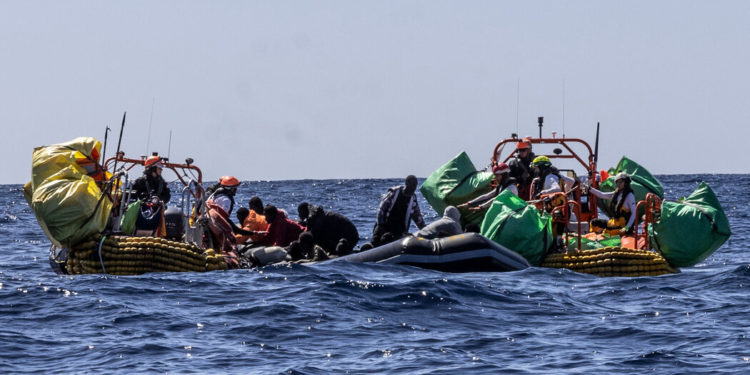By THE NEW YORK TIMES
A European humanitarian aid group said on Thursday that about 50 migrants died after their small boat deflated during an attempt to cross the central Mediterranean Sea.
A ship belonging to the charity, SOS Mediterranee, spotted the deflating rubber dinghy on Wednesday, in international waters under the Libyan rescue jurisdiction. Twenty-five dehydrated and exhausted migrants were on board.
The survivors told the charity that they had been adrift for four days, since the engine on their dinghy broke. Some 50 other people were with them when they departed from the Libyan port of Zawiya, they told the rescuers, including two infants and four women. There were only male survivors, half of them boys, the charity said.
Valeria Taurino, the director general of SOS Mediterranee, said the situation on board was “disastrous.”
Two of the passengers were unconscious when they were found and were evacuated by the Italian military for treatment on shore. The rest, hailing from Gambia, Mali and Senegal, showed signs of dehydration, exhaustion and burns from fuel on the boat, and were receiving medical treatment aboard the charity’s ship, the Ocean Viking, Ms. Taurino said.
The Ocean Viking was heading to disembark the passengers at Ancona, on the northeastern Italian coast, over 1,400 miles from where the survivors were found. The government says it is spreading the burden of identifying and later housing migrants. But charity groups argue that the practice is aimed at keeping ships occupied and off the ocean where they look for migrant boats and making rescues more expensive in terms of fuel consumption.
Migration advocates say there is a glaring scarcity of rescuers in the central Mediterranean. The U.N. International Organization for Migration said that 227 migrants had died on the Mediterranean route this year, without taking into account the most recent shipwreck. While arrivals have decreased by 70 percent compared with 2023, the death rate is not falling as rapidly.
“Deaths are down by 20 percent only,” said Flavio Di Giacomo, a spokesman for the International Organization for Migration in Italy. “It is a clear sign that the rescue system at sea is insufficient, and people keep dying as a result.”







Discussion about this post